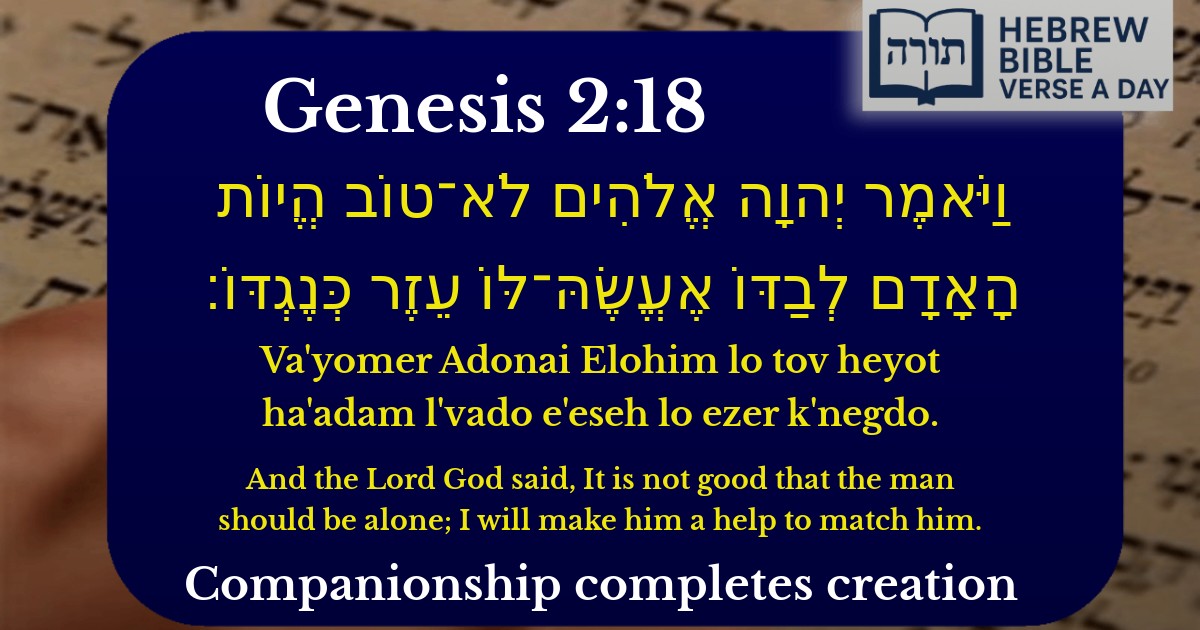Join Our Newsletter To Be Informed When New Videos Are Posted
Join the thousands of fellow Studends who rely on our videos to learn how to read the bible in Hebrew for free!
Hebrew Text
וַיֹּאמֶר יְהוָה אֱלֹהִים לֹא־טוֹב הֱיוֹת הָאָדָם לְבַדּוֹ אֶעֱשֶׂהּ־לּוֹ עֵזֶר כְּנֶגְדּוֹ׃
English Translation
And the Lord God said, It is not good that the man should be alone; I will make him a help to match him.
Transliteration
Va'yomer Adonai Elohim lo tov heyot ha'adam l'vado e'eseh lo ezer k'negdo.
Hebrew Leining Text
וַיֹּ֙אמֶר֙ יְהֹוָ֣ה אֱלֹהִ֔ים לֹא־ט֛וֹב הֱי֥וֹת הָֽאָדָ֖ם לְבַדּ֑וֹ אֶֽעֱשֶׂה־לּ֥וֹ עֵ֖זֶר כְּנֶגְדּֽוֹ׃
Parasha Commentary
📚 Talmud Citations
This verse is quoted in the Talmud.
📖 Yevamot 63a
The verse is cited in a discussion about the importance of marriage and companionship, emphasizing that it is not good for a person to be alone.
📖 Kiddushin 2b
The verse is referenced in the context of discussing the mitzvah of marriage and the creation of woman as a helper suitable for man.


The Need for Companionship
The verse states, "It is not good that the man should be alone" (Bereshit 2:18). Rashi explains that this teaches that solitude is not fitting for humanity, as it leads to a lack of fulfillment and purpose. The Midrash (Bereshit Rabbah 17:2) elaborates that without companionship, Adam lacked the ability to engage in meaningful dialogue, procreation, and mutual support, which are essential aspects of human existence.
The Concept of Ezer Kenegdo
Hashem declares, "I will make him a help to match him" (עֵזֶר כְּנֶגְדּוֹ). The term ezer kenegdo is complex. Rashi interprets it as meaning that if man is worthy, his partner will be a "help" (ezer), but if he is unworthy, she will be "against him" (kenegdo). The Talmud (Yevamot 63a) further explains that a righteous spouse elevates her husband, while an incompatible one may challenge him.
The Purpose of Marriage in Jewish Thought
Rambam (Hilchot Ishut 15:2) emphasizes that marriage is not merely for companionship but for fulfilling the mitzvah of pru u’revu (procreation) and building a home founded on Torah values. The Midrash Tanchuma (Noach 1) adds that a spouse provides emotional and spiritual balance, allowing a person to grow in their divine service.
Divine Intent in Creation
The Sforno comments that Hashem designed humanity for partnership, as solitary existence does not reflect the divine image (tzelem Elokim), which includes the capacity for love, communication, and unity. The Netziv (Ha'amek Davar) adds that this verse sets the foundation for all human relationships, emphasizing that true fulfillment comes through meaningful connection with others.